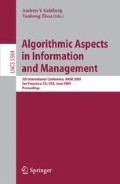Abstract
The Banzhaf index, Shapley-Shubik index and other voting power indices measure the importance of a player in a coalitional game. We consider a simple coalitional game called the spanning connectivity game (SCG) based on an undirected, unweighted multigraph, where edges are players. We examine the computational complexity of computing the voting power indices of edges in the SCG. It is shown that computing Banzhaf values is #P-complete and computing Shapley-Shubik indices or values is NP-hard for SCGs. Interestingly, Holler indices and Deegan-Packel indices can be computed in polynomial time. Among other results, it is proved that Banzhaf indices can be computed in polynomial time for graphs with bounded treewidth. It is also shown that for any reasonable representation of a simple game, a polynomial time algorithm to compute the Shapley-Shubik indices implies a polynomial time algorithm to compute the Banzhaf indices. This answers (positively) an open question of whether computing Shapley-Shubik indices for a simple game represented by the set of minimal winning coalitions is NP-hard.
Access this chapter
Tax calculation will be finalised at checkout
Purchases are for personal use only
Preview
Unable to display preview. Download preview PDF.
References
Arnborg, S., Corneil, D.G., Proskurowski, A.: Complexity of finding embeddings in a k-tree. SIAM J. Algebraic Discrete Methods 8(2), 277–284 (1987)
Arnborg, S., Proskurowski, A.: Linear time algorithms for NP-hard problems restricted to partial k-trees. Discrete Appl. Math. 23(1), 11–24 (1989)
Aziz, H.: Complexity of comparison of influence of players in simple games. In: Proceedings of the Second International Workshop on Computational Social Choice (COMSOC 2008), pp. 61–72 (2008)
Aziz, H., Lachich, O., Paterson, M., Savani, R.: Wiretapping: the nucleolus of connectivity (submitted, 2009)
Bacher, R.: Determinants of matrices related to the Pascal triangle. J. Théor. des Nombres Bordeaux 14, 19–41 (2002)
Bachrach, Y., Markakis, E., Procaccia, A.D., Rosenschein, J.S., Saberi, A.: Approximating power indices. In: AAMAS 2008: Proceedings of the 7th international joint conference on Autonomous agents and multiagent systems, pp. 943–950 (2008)
Bachrach, Y., Rosenschein, J.S.: Computing the Banzhaf power index in network flow games. In: AAMAS 2007: Proceedings of the 6th international joint conference on Autonomous agents and multiagent systems, pp. 1–7. ACM Press, New York (2007)
Bachrach, Y., Rosenschein, J.S., Porat, E.: Power and stability in connectivity games. In: AAMAS 2008: Proceedings of the 7th international joint conference on Autonomous agents and multiagent systems, pp. 999–1006 (2008)
Bailey, R.A.: Surveys in Combinatorics. Cambridge University Press, Cambridge (1997)
Ball, M.O.: Computational complexity of network reliability analysis: An overview. IEEE Transactions on Reliability 35(3), 230–239 (1986)
Borm, P., Hamers, H., Hendrickx, R.: Operations research games: A survey. TOP: An Official Journal of the Spanish Society of Statistics and Operations Research 9(2), 139–199 (2001)
Brandes, U., Erlebach, T.: Network Analysis: Methodological Foundations. Springer, Heidelberg (2005)
Crama, Y., Leruth, L.: Control and voting power in corporate networks: Concepts and computational aspects. European Journal of Operational Research 178(3), 879–893 (2007)
Curiel, I.: Cooperative Game Theory and Applications: Cooperative Games Arising from Combinatorial Optimization Problems. Springer, Heidelberg (1997)
Deegan, J., Packel, E.: A new index of power for simple n-person games. International Journal of Game Theory 7(2), 113–123 (1978)
Dubey, P., Shapley, L.S.: Mathematical properties of the Banzhaf power index. Mathematics of Operations Research 4(2), 99–131 (1979)
Faliszewski, P., Hemaspaandra, L.A.: The complexity of power-index comparison. In: Fleischer, R., Xu, J. (eds.) AAIM 2008. LNCS, vol. 5034, pp. 177–187. Springer, Heidelberg (2008)
Godsil, C., Royle, G.: Algebraic Graph Theory. Springer, Heidelberg (2001)
Granot, D., Maschler, M.: Spanning network games. International Journal of Game Theory 27(4), 467–500 (1998)
Holler, M.: Forming coalitions and measuring voting power. Political Studies 30(2), 262–271 (1982)
Korte, B., Vygen, J.: Combinatorial Optimization: Theory and Algorithms, 3rd edn. Springer, Germany (2006)
Valiant, L.G.: The complexity of enumeration and reliability problems. SIAM Journal on Computing 8(3), 410–421 (1979)
van den Nouweland, A., Tijs, S., Maschler, M.: Monotonic games are spanning network games. International Journal of Game Theory 21(4), 419–427 (1993)
Author information
Authors and Affiliations
Editor information
Editors and Affiliations
Rights and permissions
Copyright information
© 2009 Springer-Verlag Berlin Heidelberg
About this paper
Cite this paper
Aziz, H., Lachish, O., Paterson, M., Savani, R. (2009). Power Indices in Spanning Connectivity Games. In: Goldberg, A.V., Zhou, Y. (eds) Algorithmic Aspects in Information and Management. AAIM 2009. Lecture Notes in Computer Science, vol 5564. Springer, Berlin, Heidelberg. https://doi.org/10.1007/978-3-642-02158-9_7
Download citation
DOI: https://doi.org/10.1007/978-3-642-02158-9_7
Publisher Name: Springer, Berlin, Heidelberg
Print ISBN: 978-3-642-02157-2
Online ISBN: 978-3-642-02158-9
eBook Packages: Computer ScienceComputer Science (R0)

